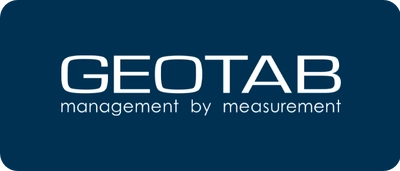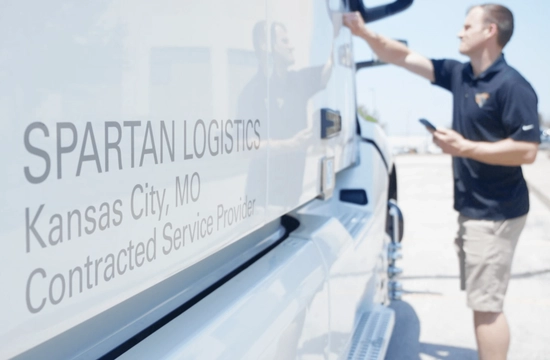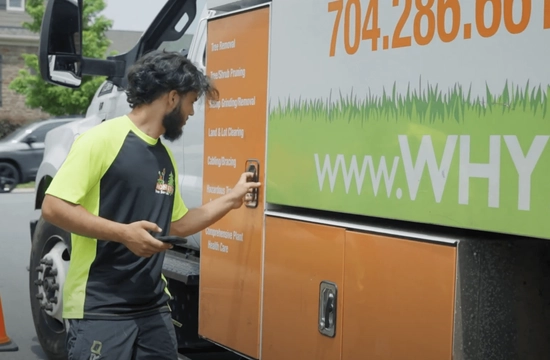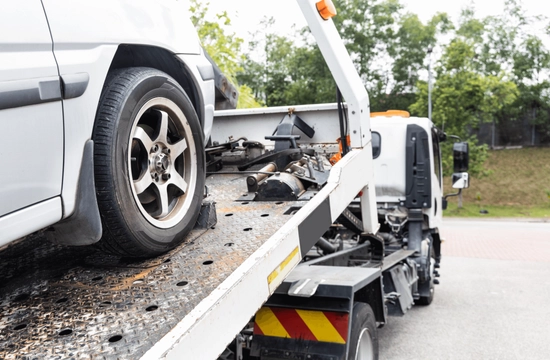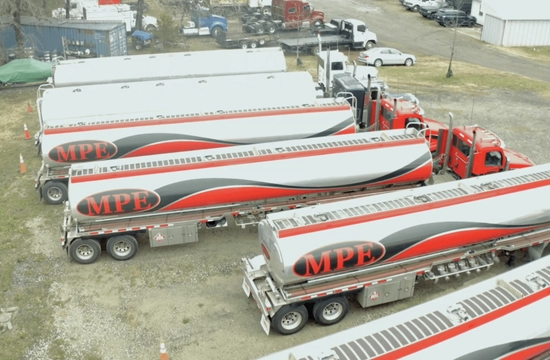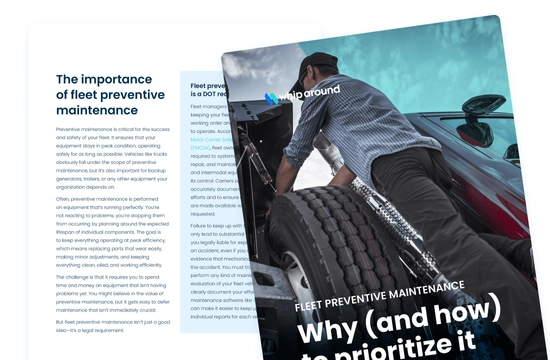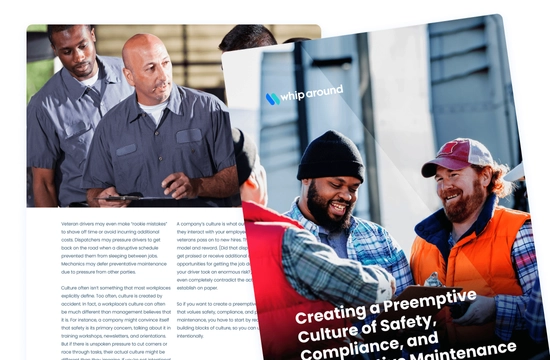- SolutionsMaintenance
Fleet maintenance software for vehicles and equipment
ComplianceEverything you need to keep your fleet compliant with the DOT
InspectionsVehicle inspection software that keeps you compliant and cuts costs
ReportingAccess the vital data you need to optimize the performance of your fleet
Fuel ManagementTrack fuel usage in real time and maximize profitability through fuel cost tracking
IntegrationsSee all - CustomersFeatured Case StudiesSee all
![Spartan Logistics]() Spartan Logistics
Spartan LogisticsSpartan Logistics is a safer, more efficient business by keeping their maintenance up and costs down with Whip Around.
View case study![Monster Tree Service]() Monster Tree Service
Monster Tree ServiceWhip Around gives Monster Tree Service visibility on vehicle & equipment location, condition, what work is due and what has been completed
View case study![Northwest Repossession]() Northwest Repossession
Northwest RepossessionNorthwest Repossession saves tens of thousands of dollars every year by staying totally compliant with Whip Around.
View case study![M. Pittman Enterprises]() M. Pittman Enterprises
M. Pittman EnterprisesThe team at M. Pittman turned to Whip Around for a digital solution to take the guesswork out of their preventive maintenance process.
View case study - ResourcesFeatured ContentSee all
![eBook: Fleet preventive maintenance: Why (and how) to prioritize it]() eBook: Fleet preventive maintenance: Why (and how) to prioritize it
eBook: Fleet preventive maintenance: Why (and how) to prioritize itEverything you need to make preventive maintenance a priority for your fleet.
View eBook![eBook: Creating a preemptive culture of safety, compliance, and preventive maintenance]() eBook: Creating a preemptive culture of safety, compliance, and preventive maintenance
eBook: Creating a preemptive culture of safety, compliance, and preventive maintenanceHow to build a preemptive culture of safety in six steps.
View eBookResource Type - Pricing
FMCSA Document Requirements for Heavy Commercial Truck Drivers in the U.S. Part 1

The U.S. Department of Transportation requires heavy commercial vehicles weighing 10,000 pounds and above to undergo mandatory inspection. The inspection ensures that all vehicle parts remain in excellent condition and that the driver remains fit and skilled for the work. To facilitate the inspection process, drivers and motor carriers should show various documents dispatched at inspection zones. In this guide, we will explore the essential documents that heavy commercial truck drivers should have before the inspection.
State Driver’s License or Commercial Driver’s License (CDL) for Heavy Commercial Truck Drivers
Driving a commercial vehicle requires special skills, knowledge, physical abilities, and experience compared to driving a regular vehicle. All commercial vehicles drivers should have a commercial driver’s license, which is acquired after skills and knowledge testing. To obtain the CDL, a driver should:
- Have a valid driving license for non-commercial vehicles
- Be more than 18 years old
- Have a minimum of two years of driving
- Have a valid certificate for medical examination
It’s advisable to obtain your CDL in your home state. Most importantly, you should have a special CDL endorsement if you will be carrying hazardous materials, driving a truck with a tank, or with multiple trailers.
Medical Examiner’s Certificate or Waiver and Skill Performance Evaluation Certificate (If Applicable)
A Medical Examiner’s Certificate (MEC) determines if a driver is medically fit to drive a heavy commercial vehicle. Drivers must be truthful when giving out their health history because there is a penalty for providing false information. All commercial drivers should carry a valid medical certificate to inspection zones.
A Performance Evaluation Certificate (PEC) is another essential document for drivers with impaired limbs. The certification allows such drivers to cross state lines wearing prosthetic devices. However, the drivers must prove that they can manage both on-road and off activities when wearing the prosthetic devices to get the PEC certificate.
Record of Duty Status
A record of duty status is also known as the driver’s logbook. It allows drivers for heavy commercial vehicles to record essential details such as:
- Total driving hours
- Miles traveled in the last 24 hours
- Date and vehicle number
- Address
- Overall driving remarks
Record of duty status is part of the hours of service rules which apply to all commercial vehicles drivers. Electronic Logging Device (ELD) keeps and maintains these records.
Periodic Inspection Document for All Vehicle Operations
A regular inspection ensures that the commercial vehicle is safe and all parts operational to reduce accidents. During periodic inspections, drivers for commercial vehicles are expected to show a periodic inspection document. The document shows the following details:
- Date for the last inspection
- Name and address of the commercial vehicle
- Name and address of the inspection report provider
- A certification that shows the vehicle passes the inspection
Shipping Papers or Bill of Lading
Simply put, the bill of lading is a legal document that provides evidence for the shipping of goods. Drivers for commercial vehicles should have a bill of lading, among other shipping documents, to prove that they have been given the authority to transport the goods to the said destination.
Shipping papers are essential in cases where the driver is carrying hazardous materials. The shipping documents should indicate the materials by their name, the packaging used and the truck safety measures observed in the shipping process.
Hazardous Materials Documents
Hazardous materials are materials that can cause a threat to the environment. These materials include explosives, gasses, flammable liquids, infectious substances, corrosives, and radioactive materials. Drivers shipping such materials should have the shipping document and comply with the FMCSA requirements of labeling, marking, and placarding. The drivers should also undertake training to learn a few things about the security of carrying those substances.
During a DOT inspection, drivers carrying hazardous substances are expected to show multiple documents such as emissions certificates, trailer safety certificates, or truck safety certificates that comply with the FMCSA rules.
Heavy Commercial Truck Drivers Need Proof of Insurance
Proof of insurance can be an insurance ID card or any other official paper from the insurance firm. Heavy commercial vehicles need insurance for compensation should any accident or injury happen on the road and cause injuries. Comprehensive insurance is the best for commercial vehicles as it provides compensation against multiple dangers such as accidents, loss of goods, and many more.
The insurance company will provide proof of insurance once the policy has been purchased. Drivers are required to provide proof of insurance at the inspection check points.
- Foreign motor carriers should carry MCS-90 Form – proof of liability insurance endorsement.
- Mexico domiciled motor carriers allowed to travel along the Mexico – U.S commercial zones should provide valid proof of CDL insurance.
Vehicle Registrations for Heavy Commercial Truck Drivers

The USDOT requires all commercial vehicles to have a valid registration. It’s therefore mandatory for commercial vehicle drivers to provide the trailer registration document, especially when moving from one state to another.
The document should provide the essential truck registration details such as truck identification number, license plate number, insurance policy, and proof that you have paid tax dues. Also, the Motor Carrier Authority requires Mexico domiciled motor carriers allowed to operate in the U.S Mexico zones to provide a certificate of registration.
Heavy Commercial Truck Drivers Must Keep Any Receipts Obtained Throughout the Trip
FMCSA classifies receipts, invoices, and other payment records as supporting documents. Drivers for commercial vehicles must produce the receipts received in the last 24 hours of the trip. These receipts are kept for safety reasons, and a driver should submit them upon request.
Fuel Tax
Commercial heavy vehicles should keep authentic documents of their fuel usage, mileage, and any other fuel taxes accrued. Fuel tax documents require a high level of accuracy, so drivers for commercial vehicles should keep the documents well and present them in time of need.
The fuel tax agreement is not mandatory, but drivers should keep it handy if needed. Other than the IFTA certificate, some states may ask for more state permits like a heavy vehicle use tax international registration plan, among others.
Join Thousands of Fleets Using Whip Around
Whip Around is a web and mobile-based inspection platform for heavy commercial vehicles. We help businesses control the inspection process online or using smartphones to save time and improve customer experience. Book a demo today or contact us for more information.

